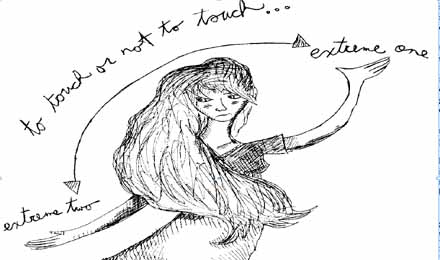As senior Doreen Cohen and Josh Chowaiki – a sophomore who’s the younger brother of her friend Joey – embraced in a hug between classes Feb. 11, Tanach teacher Rabbi Richler was visibly distraught.
“Hey, you!” he yelled across the hallway in his signature comic nasal tone. “Get your hands off my girl!”
Doreen and Josh smiled and went their separate ways, leaving Rabbi Richler shaking his head. In urging them apart, he was invoking the Jewish concept of shomer negiah, literally “guarding touch,” which restricts members of the opposite gender from any physical contact whatsoever, including high-fives, hand shakes, hugs, kisses, and beyond, unless they’re siblings, parents and children, or spouses.
“It wouldn’t be effective to lecture them about halacha,” or Jewish law, Rabbi Richler explained about his approach to shomer negiah infringements at school, “so instead I just hint that they shouldn’t be doing things like that. The message goes down a lot easier when I say it in a joking way than if I cited Shulchan Aruch.”
The Shulchan Aruch, a written compilation of Jewish rules, states that “a man should ever avoid women; he should not make gestures at them… wink at them… act with levity in their presence, nor gaze at their beauty” (Book IV, Section 8).
Although this passage doesn’t specifically forbid touch, it is considered a kal vachomer situation, where a conclusion can be drawn from a minor infraction to formulate a major one, explained Gemarah teacher Rabbi Haim Ovadia.
In addition, because the Torah specifically forbids sexual intimacy in so many situations, rabbinical authorities created the idea of shomer negiah as a safeguard — a fence that makes a huge sin much more unlikely because of the numerous smaller sins that would need to be violated first.
But in an assembly for junior and senior girls Feb. 23, Tahlia Miller, wife of famed Jewish reggae performer Matisyahu, gave completely different, non-legalistic reasons for the practice. Tahlia screened clips from a documentary she helped film called “Can’t Touch This” and spoke candidly about her opinions on premarital contact.
“Touch is an incredibly powerful tool and it’s totally in our control,” Mrs. Miller said, “but it has the potential to be degraded very quickly when we abuse it. Saving everything for your husband creates a very special, holy bedroom space. This way, every kiss, every touch means something.”
The film featured perspectives on intimacy from secular NYU students, strangers in Times Square and a sex therapist, among others. In one segment, a college boy considered a superficial sexual encounter he’d had. He recalled his friends congratulating him for his accomplishment, but he seemed to regret the incident.
“Everyone you touch becomes a part of you,” he reflected.
Shalhevet policy requires students to adhere to the practices of shomer negiah on campus, though as with most other violations of school policy, there is no set consequence for breaking it.
On citations, Shalhevet’s disciplinary method of choice, shomer negiah infractions are not listed among the possible violations. Only three are: eating in non-designated areas, tardiness exceeding three minutes, and dress code. However, students can, and on many an occasion have, received shomer negiah citations using the “other” category.
“As a Modern Orthodox school, our official stance is that because it is in violation of Jewish law, we cannot permit violations of shomer negiah on campus,” said Head of School Rabbi Weinbach.
“However, thoughtful educators need to consider how much of a student’s religious self-esteem should hinge on being shomer negiah which, when viewed in the context of societal influences, is an immensely challenging mitzvah,” he continued. “It may be more valuable to emphasize healthy and respectful social relationships with an eye toward the ideal of shomer negiah.”
Student perspectives on the practice itself differ. While some find that keeping shomer negiah helps them strengthen their relationships, others see it as more of a hindrance than a help.
“Shomer negiah enhances my relationships on a personal and emotional level,” said senior Zach Miller. “Being attracted to someone is a sign of a healthy person, but I feel a lasting satisfaction knowing my impulses and being able to control them at will.
“When you take physical aspects out of the picture, it’s easier to be honest in assessing relationships,” expanded Zach. “Without touch, you can analyze your bonds with people more clearly.”
Fellow senior Emma Lipner, like many others, thought the opposite might be true.
“I don’t think it’s realistic at our age to refrain from all physical touch,” Emma said. “We have urges we want to act on, and if we’re cooped up in a shomer negiah nut house, we won’t be prepared for real world relationships.
“Touching does distort your perception of people somewhat,” Emma conceded, “but it really matters to what extent. Asexual touching, things like hugs and hand-shakes, are completely different from more intimate, sexual acts.”
Yet on both sides of the debate, students believe that complete abstention from touch also has the potential to create some very uncomfortable situations.
“I recently reunited with a very old friend and I stretched my arms out to hug her,” said freshman Sammy Sheff. “She kind of shrugged me away awkwardly.”
Sophomore Josh Meisel experiences a similar sort of unease on a daily basis.
“I find it difficult, especially in the hallways,” he explained, alluding to Shalhevet’s congested hallway traffic in which students routinely jostle each other during the three-minute passing period to get to class on time.
“Sometimes I have to wait five minutes to get through to my next class just to avoid contact,” he said.
“Overall, though, people are very respectful. I routinely receive shomer high-fives,” Josh added, demonstrating the act by moving his hands together and stopping them within a few inches of each other.
Whether students choose to adhere to shomer negiah outside of school has no bearing on school policy or enforcement.
“Our responsibility is to maintain standards of halacha while on campus in hoping that the Jewish practices of students with regards to shomer negiah will deepen with time,” said Rabbi Weinbach.
Is that hope being realized?
“We need to articulate a clear policy with regards to shomer negiah, create buy-in from the students, and fairly enforce these policies,” said Jewish Philosophy and Law teacher Rabbi Ari Leubitz. “Right now, I don’t think we’ve created full buy-in from our students.”
But to Rabbi Weinbach, it’s too soon to tell whether Shalhevet’s implementation of the practice has influenced students’ outside decisions.
“The true measure of deepening practice is what students choose to do for themselves after Shalhevet, after university, and when they start settling down and having families of their own,” he said.
In the meantime, Shalhevet students like Doreen and Josh are in the process of defining the degree to which shomer negiah applies to them.
“I don’t feel like you become a better person by not being allowed to touch people of the opposite sex,” said Josh. “And if I do touch someone, the punishment I get for it doesn’t encourage me to change my ways and become shomer negiah.”
But even the most seemingly nonsexual behavior, like a hallway hug between friends, can act as a conduit for further acts, argued Educational Director Rabbi Feinerman.
“The Rambam says that the only thing forbidden is touching for sexual pleasure,” Rabbi Feinerman said. “But we’re not always honest with ourselves about the intentions of our actions. Things can quickly escalate.”
Josh, however, feels that it’s possible to touch someone platonically without fear of escalation, as in the case with Doreen.
“Honestly, 99.999 percent of the time I touch someone, it won’t escalate into something more,” said Josh. “It’s not worth refraining from touch completely in order to avoid the .001% chance of it evolving.”
And the feeling is mutual.
“Hugging is affectionate in a friendship way, but it definitely doesn’t have to mean that there’s something else going on,” said Doreen.
“He’s my best friend’s brother!” she laughed. “There was definitely no romance when I was hugging Josh.”




















